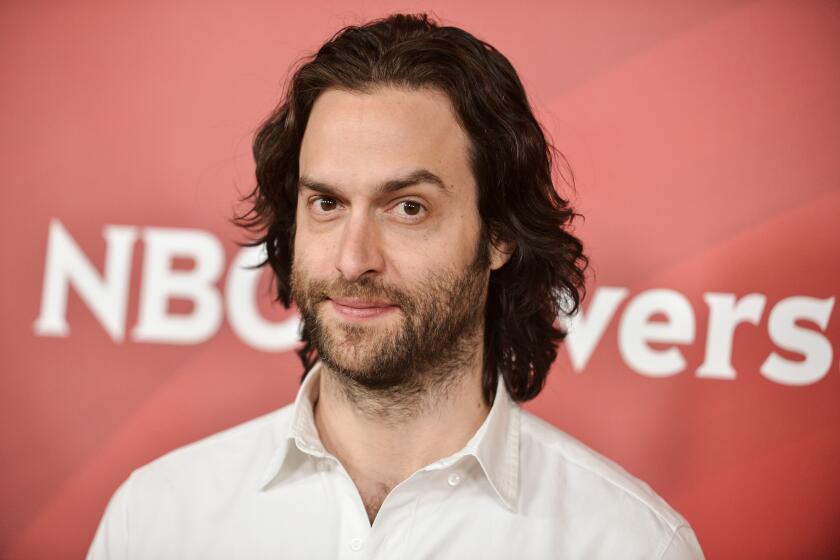Penn Badgley calls allegations against ‘You’ co-star Chris D’Elia ‘very disturbing’
Actor Penn Badgley joined Whitney Cummings, Amy Schumer and others in commenting publicly on allegations that actor and comedian Chris D’Elia made aggressive sexual overtures to multiple women over a period of years, including several who were underage at the time. (D’Elia has denied the allegations, saying in a statement to TMZ, “All of my relationships have been both legal and consensual and I have never met or exchanged any inappropriate photos with the people who have tweeted about me.” D’Elia has been dropped by both his agent and his manager, The Times confirmed Tuesday.)
“The idea that a show like ours would indirectly, unwittingly be a haven for people who are abusive is disturbing. It’s very disturbing,” Badgley said of his “You” costar D’Elia, who plays a beloved comedian who drugs and assaults young women and girls in Season 2 of the Netflix series.
In an interview Monday for an upcoming episode of The Times’ TV podcast, “Can’t Stop Watching,” Badgley situated the accusations against D’Elia, some of which were detailed by five women in a Times report published Saturday, in the context of the systemic problems of toxic masculinity and abuse of women — two subjects at the center of “You,” in which Badgley stars as a charming stalker.
“What is really important is to recognize ... the practices, the regulations, the laws that underwrite every one of these systems that act as a haven for the individuals that take advantage, namely white men,” Badgley said, noting that “the level of change we’re looking for” cannot be limited to bringing individuals to justice.
Badgley also pointed out that “You” attempts to deconstruct pop cultural tropes that perpetuate damaging norms around sex and gender. As executive producer Sera Gamble told The Times when the series premiered on Lifetime in 2018, “That is a primary purpose of the show, to take a hard look at ... what’s really going on underneath the tropes that we have embraced as a culture.” According to Badgley, after the allegations against D’Elia emerged, producers of “You” reached out to actress Jenna Ortega, who shared screen time with D’Elia, “to make sure she felt safe.” “We can feel safe and sound there,” he said.
Read Yvonne Villarreal’s exchange with Badgley below. The podcast episode will premiere July 2.
Amid multiple social media allegations against Chris D’Elia, women spoke to The Times about encounters with the stand-up comic and TV actor.
Have the allegations against Chris caused you to think more about those themes of toxic masculinity — in the show or even in your character, who is a predator in his own right? I know these are things that you have struggled with openly before and I just wonder how recent days have made you think about it even more deeply?
Systemically, it needs to be addressed. Individually, it needs to be addressed. Am I the person to address all of those things? You know — it did affect me deeply. I was very troubled by it. I am very troubled by it. I don’t know Chris. I know that, if there’s anything we need to do in this age, it’s to believe women.
I also know there’s a lot that I cannot speak to, obviously. And I think the one thing that I can speak to that is maybe relevant for listeners now is that individuals of course need to be brought to justice as much as that is possible. Right? One thing that our culture tends to do quite systematically and methodically is to revel in identifying villains so that the system can remain evil. I’m sorry, I shouldn’t say “evil.” Well, you know, I don’t know — if it’s not evil, I don’t know what is. So that the system can remain intact and unchanged, we point to individuals in power who, yes, are upholding and perpetuating these terrible norms, which are often abusive if not downright lethal. So those individuals ideally would be brought to justice. Ideally there would be less of those individuals.
But what is really important is to recognize that the policies that underwrite every given system — the practices, the regulations, the laws that underwrite every one of these systems which act as a haven for the individuals that take advantage, namely white men. And women — but, you know, white people, and white men. And white men of a particular breed, who are successful and charismatic. I think that we need to remember that that is the level of change we’re looking for.
So what I think about, then, in my position? Certainly, I think of my own conduct, and I am thankful that I have tried to uphold a certain level of conduct throughout my life. I also am thinking about how to somehow not — the idea that a show like ours would indirectly, unwittingly be a haven for people who are abusive is disturbing. It’s very disturbing. What does it take to change that? Because it’s not just vetting individuals. There needs to be a change in culture and attitude so that that kind of behavior is so clearly reprehensible, it’s so clearly, like, anti-human. That is also what I think about on a given project that I’m on. And, you know, to the degree that the subject matter is conflicting and challenging in that end, trying to create that culture, does a show like ours help to create that culture? Well, I know that at least our show is trying to be — thinks about things in a dismantling, deconstructive manner. I would hope that at least our show is not serving to uphold these kind of, like, bunk ways of being and these systems, right? So, you know, that’s as much as I think I can and should say, you know? But I do appreciate you asking it, because it’s super important.
Well, it’s also figuring out how women and young girls can dismantle their own, sort of, conditioning. And, you know, we’re seeing that some of that is happening, and it helps when people like you speak out about it instead of staying silent.
I think I’ve spoken out a lot about it generally and, you know, I — unfortunately, in this case, I feel like I’m not involved. You know, the first thing our producers did was reach out to Jenna, who played Ellie, the girl opposite Chris in those scenes, just to make sure she felt safe. We can feel safe and sound there. So, as far as our show is concerned, as far as we’re concerned, there’s only so much we can take responsibility for. And I say “we” pretty broadly, because we’re all doing different things. I’m, at the end of the day, an actor, and I don’t have a lot to do with a lot of this stuff. But I do think, in the future, I would like that to change, personally.
More to Read
The complete guide to home viewing
Get Screen Gab for everything about the TV shows and streaming movies everyone’s talking about.
You may occasionally receive promotional content from the Los Angeles Times.








